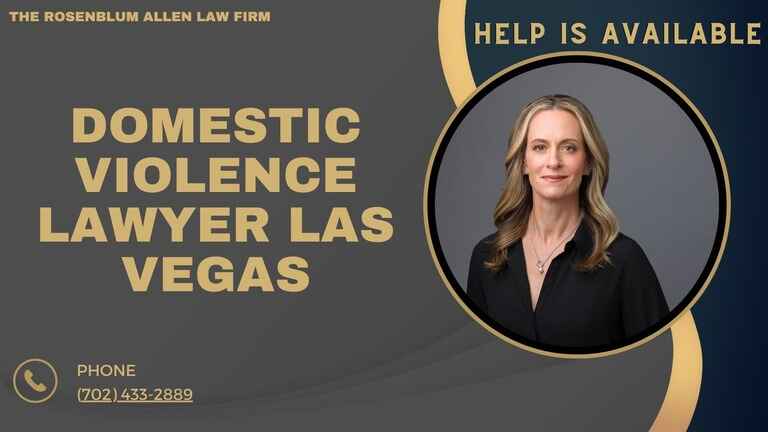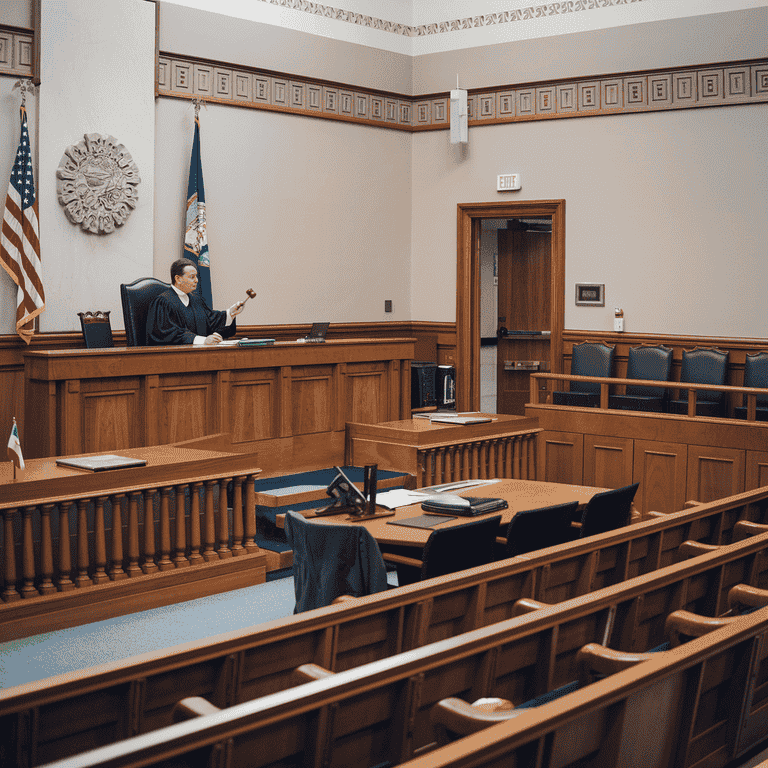Understanding Domestic Violence in Nevada
Definition of Domestic Violence
Legal Definition
Domestic violence, under Nevada law, refers to abusive behavior in a relationship. This can involve physical harm, threats, or emotional abuse directed toward a partner or family member. The legal framework includes various acts committed against:
- Spouses or former spouses
- Individuals who share a child
- Cohabitants or former cohabitants
- Relatives by blood or marriage
Grasping this definition is fundamental. It helps victims recognize their situation and empowers them to seek legal assistance.

 Types of Domestic Violence
Types of Domestic Violence
Domestic violence can take several forms, each with its own impact. Here are the primary types:
- Physical Abuse: This includes hitting, slapping, or any form of physical harm.
- Emotional Abuse: This may involve verbal attacks, intimidation, or manipulation aimed at undermining the victim’s self-esteem.
- Economic Abuse: This occurs when one partner controls the other’s access to financial resources, making them financially dependent.
- Sexual Abuse: This involves any non-consensual sexual act or coercion.
Recognizing these types can help victims identify their experiences and take the necessary steps to protect themselves.
The Impact of Domestic Violence
Effects on Victims
The consequences of domestic violence extend beyond immediate physical harm. Victims often face:
- Physical Consequences: Injuries ranging from bruises to life-threatening conditions.
- Emotional Consequences: Anxiety, depression, and post-traumatic stress disorder (PTSD) are common.
- Long-term Psychological Effects: Victims may struggle with trust issues, low self-esteem, and difficulty in forming future relationships.
These effects can linger long after the abuse has ended, affecting various aspects of a victim’s life.
Effects on Children
Children exposed to domestic violence are particularly vulnerable. The implications include:
- Impact on Child Development: Witnessing violence can disrupt a child’s emotional and cognitive development.
- Behavioral Issues: Children may exhibit aggression, anxiety, or withdrawal.
- The Cycle of Abuse: Children who witness domestic violence are at a higher risk of becoming abusers or victims in adulthood.
Understanding the effects on children highlights the need for immediate action to protect families.
When to Hire a Domestic Violence Lawyer
Signs You Need Legal Representation
Immediate Threats
If you feel your safety is at risk, it’s vital to seek legal representation. Indicators of imminent danger may include:
- Escalating Violence: If your partner has increased aggression or threats.
- Isolation Tactics: Being cut off from friends and family can indicate manipulation.
- Access to Weapons: If your partner possesses weapons and has threatened to use them.
In such cases, contacting a domestic violence lawyer can help you navigate the legal options available for protection.
Ongoing Abuse
If abuse is a recurring issue, legal action is often necessary. Signs include:
- Repeated Incidents: Regular patterns of physical or emotional abuse.
- Fear of Retaliation: Concern about what might happen if you speak out or leave.
- Seeking Help: Repeatedly trying to find support but feeling trapped.
Recognizing these signs is the first step in reclaiming your life.
Seeking Restraining Orders
If you’re considering a restraining order, legal guidance is essential. A domestic violence lawyer can help you understand:
- Types of Restraining Orders: Temporary and extended orders designed to keep abusers away.
- The Process: How to file, what documents you need, and what to expect during hearings.
Having a lawyer can significantly ease this process, ensuring you take the right steps to protect yourself.
Benefits of Hiring a Lawyer
Legal Expertise
Navigating the legal system can be complex. A lawyer specializing in domestic violence understands:
- The Law: They will explain your rights and the legal definitions that apply to your situation.
- The Process: They can guide you through every step, from filing reports to attending court hearings.
Emotional Support
Legal battles can be emotionally draining. A compassionate lawyer can provide:
- Reassurance: They can help you feel less alone and more empowered.
- Understanding: A lawyer familiar with domestic violence cases will understand your situation and respond sensitively.
Negotiation Skills
A skilled lawyer will advocate for your best interests. They can:
- Negotiate Settlements: Work to achieve the most favorable outcomes in custody or financial matters.
- Communicate Effectively: Serve as your voice in discussions with the opposing party.
These benefits can significantly impact the outcome of your case, ensuring your rights and needs are prioritized.

What to Expect from a Domestic Violence Case
The Legal Process
Filing a Report
The first step in addressing domestic violence is often filing a report. Here’s how it typically works:
- Contacting Law Enforcement: Call 911 if you are in immediate danger. For non-emergencies, reach out to your local police department.
- Providing Evidence: Be prepared to share details about the abuse, including dates, times, and any injuries.
- Documenting the Incident: If possible, take photos of injuries or damage to property. Keep any relevant messages or emails as proof.
Filing a report can be daunting, but it is essential for your protection and for building a case.
Obtaining a Restraining Order
A restraining order can offer vital protection. Here’s how to obtain one:
Types of Restraining Orders:
- Temporary Restraining Order (TRO): This is a short-term measure that provides immediate protection.
- Extended Restraining Order: This can last for a longer duration, usually after a court hearing.
Filing Process:
- Visit your local courthouse or family court to fill out the necessary forms.
- Explain your situation clearly, stating why you need the order.
Court Hearing:
- You may need to attend a hearing where you will present your case. Bring any evidence you have.
- The abuser may also have a chance to speak. This is a normal part of the process.
Having a lawyer by your side during this process can provide clarity and support, ensuring you are prepared for the hearing.
Court Proceedings
Court proceedings can be overwhelming, but understanding what to expect can ease your anxiety. Here’s a breakdown:
- Initial Hearing: This is where the judge hears your request for a restraining order. Be ready to share your experience.
- Evidence Presentation: You’ll present your evidence, and the abuser will have the chance to respond. It’s important to stay calm and stick to the facts.
- Decision: The judge will decide whether to grant the restraining order based on the evidence.
Potential Outcomes
Criminal Charges
If the abuser has violated the law, they may face criminal charges. Possible charges include:
- Assault: For physical harm inflicted on the victim.
- Harassment: For repeated threats or unwanted contact.
- Stalking: For following or monitoring the victim without consent.
Each of these charges carries potential penalties, including fines and imprisonment. A lawyer can guide you through the implications of these charges.
Civil Remedies
In addition to criminal charges, victims may seek civil remedies. This can involve:
- Damages for Emotional Distress: Victims may be compensated for the psychological impact of abuse.
- Property Damage Claims: If the abuser damaged personal property, you might be able to recover those costs.
Pursuing civil remedies can provide financial relief and a sense of justice.

Choosing the Right Domestic Violence Lawyer in Las Vegas
Qualities to Look For
Experience and Specialization
Choosing a lawyer with specific experience in domestic violence cases is essential. Here’s why:
- Knowledge of the Law: They will be well-versed in local laws and procedures.
- Familiarity with the Court System: An experienced lawyer understands how the system works, which can be invaluable in navigating your case.
Compassionate Approach
A lawyer’s demeanor can greatly impact your experience. Look for:
- Empathy: A compassionate lawyer will understand your situation and offer support.
- Active Listening: They should be attentive to your needs and concerns.
Having a lawyer who genuinely cares can make the legal process feel less isolating.
Track Record of Success
Reviewing a lawyer’s history can give you confidence in their abilities. Consider:
- Client Testimonials: Look for positive reviews and feedback from previous clients.
- Case Outcomes: A lawyer with a history of successful cases in domestic violence can provide peace of mind.
Questions to Ask During Consultations
Legal Strategy
Understanding a lawyer’s approach can help you feel more at ease. Ask about:
- Their Plan for Your Case: What steps do they intend to take?
- Potential Outcomes: What can you realistically expect from the process?
Communication Style
Effective communication is key to a successful attorney-client relationship. Inquire about:
- Response Time: How quickly can you expect responses to your questions?
- Preferred Communication Methods: Do they prefer phone calls, emails, or in-person meetings?
Fees and Costs
Understanding the financial aspects is crucial. Discuss:
- Retainer Fees: What is the upfront cost to secure their services?
- Hourly Rates: If applicable, what will the charges be for ongoing work?
Knowing these details will help you make an informed decision.
Resources for Domestic Violence Victims in Las Vegas
Support Services
Shelters and Safe Houses
If you need immediate protection, shelters can be a lifesaver. Consider:
- Local Shelters: Many organizations offer safe spaces for victims.
- Confidential Locations: Shelters often provide anonymity for those seeking refuge.
Counseling and Therapy
Emotional healing is just as important as legal support. Look into:
- Counseling Services: Many therapists specialize in helping domestic violence survivors.
- Support Groups: Connecting with others who have had similar experiences can provide comfort and understanding.
Legal Aid Organizations
If you need legal help but are worried about costs, there are options available:
Non-Profit Services
Many organizations provide free or low-cost legal assistance to victims. Research local non-profits that focus on domestic violence.
Community Resources
Local hotlines and support groups can offer immediate assistance and information. Make use of these resources to connect with others and gain support.

Breaking It Down for You
Navigating a domestic violence situation in Las Vegas can be overwhelming and emotionally draining. It’s vital to know that you are not alone and that help is available. Whether you’re thinking about filing a police report, obtaining a restraining order, or seeking legal representation, each step you take is significant in protecting yourself and reclaiming your life.
Choosing the right domestic violence lawyer can make all the difference. Look for someone who understands your situation, listens to your concerns, and has a proven track record in handling similar cases. Their guidance will be essential as you navigate the challenges of the legal system.
Remember, there are resources and support services available in the Las Vegas area that can provide assistance beyond legal matters. From shelters to counseling, these services can help you heal and move forward.
Taking action is a brave step towards a safer and brighter future. Trust in yourself, and don’t hesitate to seek the help you need. You deserve to live free from fear and to build a life that feels secure and fulfilling.

Frequently Asked Questions
What should I do if I am a victim of domestic violence?
If you are experiencing domestic violence, your safety is the top priority. Reach out to a trusted friend or family member, contact a local domestic violence hotline, or go to a safe place. If you are in immediate danger, call 911 for emergency assistance.
How can I find a domestic violence lawyer in Las Vegas?
You can search online for domestic violence lawyers in Las Vegas, or you can ask for referrals from friends, family, or local support groups. Look for attorneys who specialize in domestic violence cases and have good reviews from past clients.
What types of cases do domestic violence lawyers handle?
Domestic violence lawyers handle a variety of cases, including restraining orders, child custody disputes, divorce proceedings involving domestic violence, and criminal defense for individuals accused of domestic violence.
How long does it take to resolve a domestic violence case?
The timeline for resolving a domestic violence case can vary significantly based on the specifics of the situation, the court’s schedule, and whether the case goes to trial. It may take weeks to months, depending on the complexity of the case and the actions taken by both parties.
Will I need to go to court for a domestic violence case?
Whether you need to go to court depends on your circumstances. If you are filing for a restraining order or involved in a divorce or custody case related to domestic violence, court appearances may be necessary. Your lawyer can guide you through this process.
What can I expect during a restraining order hearing?
During a restraining order hearing, both parties will have the opportunity to present evidence and witness testimonies. The judge will evaluate the information provided and determine whether a restraining order is warranted based on the evidence of domestic violence.
Are there any resources available for victims of domestic violence in Las Vegas?
Yes, Las Vegas offers several resources for victims of domestic violence, including shelters, counseling services, support groups, and hotlines. Organizations like the Nevada Coalition to End Domestic and Sexual Violence and Safe Nest provide vital support and assistance.
How can I prepare for my first meeting with a domestic violence lawyer?
Before your first meeting with a domestic violence lawyer, gather any relevant documentation related to your case, such as police reports, medical records, and evidence of abuse (like photographs or text messages). Be ready to share your story clearly and openly.
What if I cannot afford a domestic violence lawyer?
If you cannot afford a lawyer, look for legal aid organizations in your area that may provide services at low or no cost. Some domestic violence shelters also have resources or referrals for legal assistance.

Additional Resources for You
Our lead attorney, Molly Rosenblum Allen, Esq., has also created additional resources to assist you during this challenging time. Here are some helpful articles that you might find beneficial:
How to Get Domestic Violence Charges Dismissed: This resource outlines the steps and strategies to pursue a dismissal of domestic violence charges effectively.
How to Get Your Gun Rights Back After a Domestic Violence Charge: This article provides detailed guidance on the process of restoring your gun rights following a domestic violence charge.
What Are the Chances of Beating a Domestic Violence Charge in Nevada?: In this piece, you’ll find an analysis of the factors that can influence your chances of successfully challenging a domestic violence charge.
Should I Request a Jury Trial for My Domestic Violence Case?: This article discusses the considerations involved in deciding whether to request a jury trial for a domestic violence case.
These resources are designed to provide you with valuable information and support as you navigate your situation.

Offsite Resources for You
Here are some offsite resources that you may find useful:
National Domestic Violence Hotline: A valuable resource for those seeking help with domestic violence situations, offering support, information, and resources.
RAINN (Rape, Abuse & Incest National Network): This organization provides support for survivors of sexual violence and offers resources for understanding and addressing domestic violence.
Women’s Law: A website offering legal information and resources for victims of domestic violence, including state-specific laws and support services.
DomesticShelters.org: This platform helps individuals find shelters and support services for victims of domestic violence across the United States.
The National Network to End Domestic Violence (NNEDV): This organization works to create a social, political, and economic environment in which violence against women no longer exists, offering advocacy and resources.
Love Is Respect: A project that focuses on educating young people about healthy relationships and offers support for those experiencing dating violence.
Safe Horizon: A leading victim assistance organization in the U.S., providing support and services for survivors of domestic violence, sexual assault, and human trafficking.

What's Next

Dear Reader,
Thank you for taking the time to explore these valuable resources on domestic violence and legal support. Your journey toward understanding and navigating this challenging situation is important, and I’m glad we could provide assistance.
If you have any questions or need personalized guidance, I invite you to schedule a free consultation. Please feel free to call us at (702) 433-2889. Our team is here to help you through this process with care and compassion.
Take care,
Molly Rosenblum Allen, Esq.
The Rosenblum Allen Law Firm



